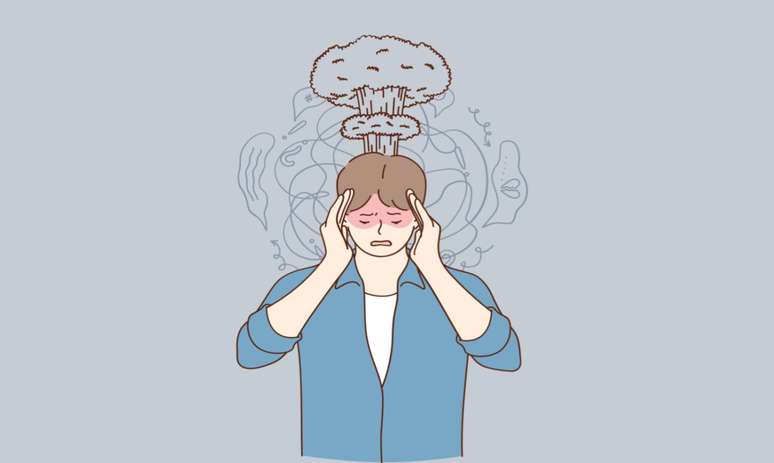Stress is a natural response of the body, but when it is in excess, it can cause serious damage to health and body
With a busy routine and an intense volume of information from all sides, it is practically impossible not to feel stressed. Stress, by the way, is a natural response of the body to difficult situations. However, when it occurs frequently or even chronically, physical and mental health at risk.
Luana Ganzert, a specialized emotional psychologist, explains that stress can arise when we face physical, emotional or mental pressures that require more than we are used to managing. “These pressures, or” stress factors “, may vary from close deadlines to work to significant changes in life, damaged health or accumulation of tasks considered important,” he says.
The feeling is nothing more than a biological response. This is because, when we meet these situations, the body releases hormones like cortisol AND adrenalinepreparing to react.
“This can be useful in dangerous situations, but if it becomes chronic or excessive, it can negatively affect our physical and mental health. Therefore, it is important to learn to manage stress and adopt practices that help to maintain a healthy and complete balance”, warns the expert.
Cortisolo: the stress hormone
Cortisol is the main hormone associated with stress, as it helps us prepare to face the challenges. When we face a stressful situation, the brain reports to the adrenal glands to release cortisol in the bloodstream, explains Luana.
“The effects of cortisol are large and influence both the body and the brain. In the body, it helps to increase blood sugar levels to provide rapid energy, increase blood pressure and suppress non -essential functions, such as the immune system and digestion,” he says.
In the brain, cortisol plays an important role in the regulation of mood, memory and response to fear or stress. “In acute situations, it can improve our ability to concentrate and face challenges. However, when cortisol is released chronic, it can have harmful effects, negatively influencing memory, brain function and contributing to mood disorders such as anxiety and depression”, warns the psychologist.
According to Luana, balance is the key. Cortisol is essential for our survival, but when in excess it can have negative impacts on our physical and mental health. Therefore, it is important to learn to manage stress and look for a balanced lifestyle that he felt the life you have chosen to live, “says the professional.
Health impact
According to the psychologist, chronic stress maintains the levels of these hormones raised for a long time, which affects our body in many ways. According to her, the prolonged effects include:
- Sleep problems;
- Fatigue;
- Irritability;
- Difficulty concentration;
- Hypertension;
- Weakening of the immune system;
- Digestive disorders.
In addition, chronic stress is associated with more serious health conditions such as heart disease, diabetes and mental disorders such as anxiety and depression, adds Luana.
“In short, stress becomes harmful when we cannot control it or when we are constantly exposed to stressful situations, leading to physical and emotional imbalances that negatively influence our quality of life. Therefore, it is essential to learn to manage it in a healthy way and look for support when necessary”, warns the professional.
When stress leads to mental health problems
Stress and mental health are interconnected in many ways. This is because chronic or excessive stress can play a significant role in the development of mental health problems such as anxiety and depression. Luana explains the report:
When we face stress for a long time, stress hormones levels such as cortisol can remain high. This can influence the chemical balance of the brain, influencing neurotransmitters such as serotonin, which are directly related to mood and emotions.
Anxiety can be triggered or exacerbated by chronic stress, leading to constant concerns, nervousness and excessive fear. On the other hand, prolonged stress can also increase vulnerability to depression as it affects the perception of well -being, self -esteem and the ability to face challenges.
“It is important to understand that each person responds to stress uniquely and not all stress will involve mental health problems. But it is essential to recognize the connection between stress and mental health in order to adopt effective stress management strategies and seek support when necessary. The car -Cure and the search for professional help are important steps to maintain good mental health,” says the expert.
10 tips to fight stress
There are different strategies that can help fight stress and promote well -being. The expert gives some suggestions that can help:
1. Exercise: Practicing physical activities regularly, such as excursions, running, yoga or dance, can release endorphins, reduce stress and anxiety levels.
2. Relaxation techniques: He experiences relaxation techniques such as meditation, deep breathing, awareness or muscle progression towards the mind and body calm.
3. Healthy nutrition: Keep a balanced diet rich in fruit, vegetables, cereals and omega-3 foods that can help fight stress.
4. Sleeping sleep: Make sure you have good sleep quality, sleep enough to feel reinvigorated and energetic during the day.
5. Time management: Organize your time effectively, establishing priorities and avoiding the overload of activity. Well structured planning can reduce the feeling of being overloaded.
6. Pleasant activities: Put aside the time to do the things you like, read, listen to music, cook or any hobby that brings happiness and relief from stress.
7. Social connections: It remains in contact with friends and family, since social support is essential to face stress. The sharing of feelings and concerns can alleviate the emotional weight.
8. Limitation of exposure to stress: Avoid situations or people who increase stress whenever possible. Establish healthy limits and learn to say not when necessary.
9. Look for personal development: Development practice can help reduce stress, increase the car -but to slow down without losing concentration on your goals.
10. Look for professional help: If stress persists or becomes overwhelming, he considers to seek help from a mental health professional, as a psychologist or psychiatrist.
Emotional management in stress control
Finally, Luana says that learning emotional management techniques, such as emotional intelligence, can be precious. “This implies the recognition and understanding of one’s emotions and the development of skills to face them healthy and constructively,” says the psychologist. According to her, the goal is not to completely eliminate stress, but to learn to manage it and find a healthy balance in your life.
Source: Terra
Ben Stock is a lifestyle journalist and author at Gossipify. He writes about topics such as health, wellness, travel, food and home decor. He provides practical advice and inspiration to improve well-being, keeps readers up to date with latest lifestyle news and trends, known for his engaging writing style, in-depth analysis and unique perspectives.









